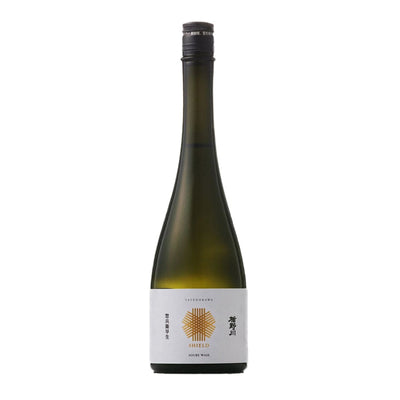Masterful Brewing: Hatsumago's Honkarakuchi Junmai Makiri
Brewing Brilliance in Sakata
酒田的酿造辉煌
In the historic port town of Sakata, Yamagata Prefecture, the Hatsumago brewery stands as a shining example of sake-making mastery. Established in 1893 by Hisakichi Sato, a shipping wholesaler with a passion for the craft, the brewery embarked on a journey that would later redefine its identity with the brand name "Kinkyu." Rooted in the rich traditions of Sakata, Hatsumago's story evolves as it embraces change and innovation.
在山形县历史悠久的港口城市酒田,初孙酒造是酿造清酒技艺的光辉典范。1893年,一位沉迷于酿造工艺的航运商人佐藤久吉(Hisakichi Sato)创立了这酒造,开始了一段酿造清酒的旅程,后来又创立了“金久”这个品牌。初孙的故事植根于酒田的丰富传统,随着它的变化和创新而不断发展。

Honoring Tradition: The Kimoto-zukuri Method
尊重传统:生酛发酵法
Guided by the teachings of Teiichiro Sakai from the esteemed Sakai family of the old Shonai clan, Hisakichi Sato initiated the sake brewing legacy. As the Showa period ushered in a new era, marked by the birth of the brewery founder's first son, the brand underwent a transformation. "Hatsumago" emerged, embodying the heartfelt aspiration that their sake would be cherished by all who sipped it.
佐藤久吉在受人尊敬的酒井家族酒井泰一郎的教导下,开创了清酒酿造的传统。随着昭和时代的到来,以酒造创始人的第一个儿子的诞生为标志,该品牌经历了转型。“初谷”出现了,体现了所有喝过他们的清酒的人都会珍惜的衷心愿望。
Since its inception, Hatsumago has upheld the time-honored "Kimoto-zukuri" method, a traditional approach that harnesses the power of lactic acid bacteria in the air to cultivate sake yeast and ward off unwanted organisms. This method, requiring a blend of skill and experience, is a rarity in Japan's sake production landscape. The result is a sake that captures the essence of the natural world, boasting a robust fermentation process that yields a deeply flavorful and clean finish.
自成立以来,初孙一直坚持历史悠久的“生酛发酵”方法,这是一种利用空气中乳酸菌的力量培养清酒酵母并抵御有害生物的传统方法。这种方法需要技巧和经验的结合,在日本的清酒生产领域是罕见的。通过及其漫长发酵过程,产生了浓郁干净的风味,酿制出一种捕捉自然世界精髓的清酒。

Signature Offering: Hatsumago Honkarakuchi Junmai Makiri
招牌产品:初孙辛口纯米魔斩
Highlighting Hatsumago's excellence is the "Hatsumago Honkarakuchi Junmai Makiri." This pure and refreshing dry sake underscores the brewery's dedication to unique fermentation techniques. Displaying the characteristics of highly refined sake, it captivates the palate with a bold taste exclusive to the Kimoto method. The interplay of lactic acid enhances strength while preserving freshness, resulting in a sake with remarkable depth and character.
“初孙辛口纯米魔斩”突显了初孙酒造的卓越。这种纯净清爽的干清酒表明了酒造对独特发酵技术的奉献,也展示了其高度精炼的清酒的特点,它以独有的生酛发酵方法酿制出的独特的口味吸引了味蕾。乳酸的相互作用增强了强度,同时保持了新鲜度,使清酒具有非凡的深度和特性。

Versatility in Every Sip
每一口的多重感
Noteworthy is the sake's intriguing transformation with temperature variations. Served at room temperature or slightly chilled, it unveils itself as a dry sake with a swift, cutting edge. When gently warmed, it unfolds, revealing a fuller, more flavorful profile that delights the senses. This versatility makes the "Makiri" a captivating companion, fit for any occasion.
值得注意的是清酒随着温度变化而发生的有趣变化。在室温或微冷的情况下饮用,它会以一种迅速而锐利的口感展现出干爽清酒的特性。当它被轻轻加热时,它会展开,呈现出更饱满、更美味的轮廓,让感官愉悦。这种多功能性使“魔斩”成为一个令人着迷的伙伴,它适合任何场合哟。
Cultural Symbolism: The Makiri Name
有文化的象征:魔斩这个名字
The name "Makiri" holds cultural significance, echoing the sharp knives used by fishermen in Sakata City. Believed to be a symbol of good luck, the name aligns with the sake's crisp and sharp taste, further enhancing its charm as a dry Junmai sake. Hatsumago remains dedicated to developing and preserving the distinct flavors of Sakata, a region blessed with abundant water, greenery, and a unique local climate. As the brewery continues to evolve, it stands as a beacon of excellence in the world of sake craftsmanship.
“魔斩”这个名字具有文化意义,与酒田市渔民使用的锋利刀具相呼应。他们认为这个名字是好运的象征,与清酒清脆的味道相一致,进一步增强了它作为干爽型纯米清酒的魅力。初孙一直致力于开发和保留酒田的独特风味,它是一个拥有水草丰茂,充满绿色植物和独特地区。随着不断发展,酒造成为清酒工艺世界中卓越的灯塔。
















Leave a comment